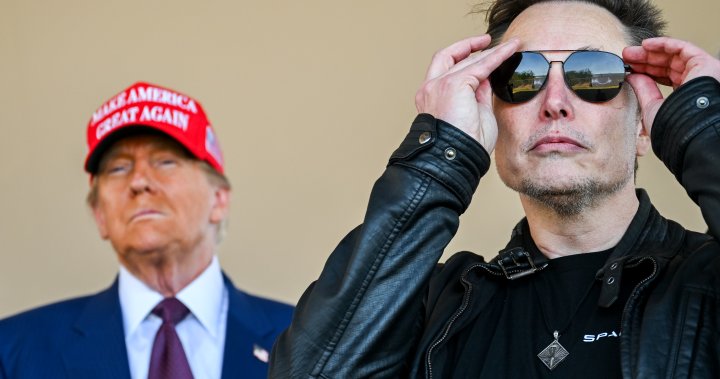The escalating tensions between the United States and Canada, fueled by the actions and rhetoric of former U.S. President Donald Trump and business magnate Elon Musk, have prompted calls for a robust Canadian response, including potential sanctions against corporations linked to Trump’s inner circle. These concerns stem from allegations of interference in Canadian domestic affairs, particularly through social media platforms controlled by Musk, echoing similar concerns raised about Russian interference following the invasion of Ukraine. Former Canadian Foreign Minister Lloyd Axworthy has voiced alarm over this potential meddling, emphasizing the need to safeguard Canadian democracy and the integrity of its electoral processes. He advocates for proactive measures to counter any attempts to undermine Canada’s sovereignty and its citizens’ right to self-determination.
Axworthy’s concerns are rooted in Musk’s close ties to Trump, including substantial financial contributions to Trump’s election campaign and public displays of support. Musk’s promotion of far-right groups and parties in Europe, coupled with his alleged dissemination of disinformation through his social media platform X (formerly Twitter), has raised red flags about his potential influence on political discourse. Furthermore, Musk’s dismissive comments about Canadian Prime Minister Justin Trudeau, echoing Trump’s rhetoric about Canada potentially becoming a U.S. state, have further fueled concerns about his intentions. These actions, coupled with past instances of X being blocked in Brazil for non-compliance with content moderation rules and ongoing investigations by the European Commission, paint a picture of a powerful individual with a penchant for challenging democratic norms and regulations.
The calls for action extend beyond mere concern about political interference. Chrystia Freeland, a Liberal leadership candidate, has urged Ottawa to impose retaliatory tariffs on Tesla vehicles, manufactured by Musk’s automotive company, in response to Trump’s proposed tariffs on Canadian goods. Furthermore, University of Waterloo political scientist Emmett Macfarlane has advocated for a more drastic approach, suggesting a potential ban on X, Tesla, and Starlink, Musk’s satellite broadband company. This proposed action mirrors sanctions imposed on Russian oligarchs, suggesting a strategy of applying pressure by targeting the economic interests of individuals deemed hostile to Canadian interests. While Freeland and Macfarlane’s calls for action are primarily based on economic concerns, Axworthy argues that the threat of political interference should be treated with equal seriousness.
Axworthy advocates for a strategy of containment, similar to the approach adopted by the U.S. towards the Soviet Union during the Cold War. This strategy would involve a combination of sanctions and diplomatic measures designed to send a clear message of disapproval without escalating into direct conflict. He emphasizes the importance of a proactive and measured response, suggesting a “counter-move” for every provocative action taken by Trump or his associates. This approach requires a delicate balance between firmness and diplomacy, ensuring that Canada’s interests are protected while avoiding unnecessary escalation of tensions. This call for a united front extends beyond Canada’s borders, with Axworthy suggesting greater collaboration with other countries that may be targeted by Trump’s expansionist rhetoric, urging a collective effort to contain what he perceives as a threat to regional stability.
The concerns voiced by Axworthy and others are not isolated incidents. NDP MP Charlie Angus has requested Elections Canada to join European investigations into X’s algorithms, seeking to determine whether Musk is using his platform to promote extremist content. Angus has expressed deep concern about Musk’s perceived anti-democratic tendencies and has criticized those who seek to appease Trump and his associates. These concerns reflect a growing awareness of the potential for social media platforms to be weaponized for political purposes, undermining democratic processes and amplifying extremist voices. This heightened vigilance underscores the need for robust oversight and regulation to ensure the integrity of online information and protect against manipulation.
The current situation reveals a complex web of political and economic tensions, exacerbated by the actions of influential figures like Trump and Musk. The calls for sanctions and other countermeasures reflect a growing unease within Canada about the potential for external interference in its domestic affairs. This situation underscores the challenges of navigating international relations in an era of increasingly interconnected economies and the pervasive influence of social media. Canada’s response will require a nuanced approach, balancing the need to protect its sovereignty and democratic values with the desire to maintain stable relationships with its closest neighbor. The situation also highlights the broader debate about the role and responsibility of powerful individuals and corporations in the digital age and the urgent need for effective mechanisms to safeguard democratic institutions from undue influence.



